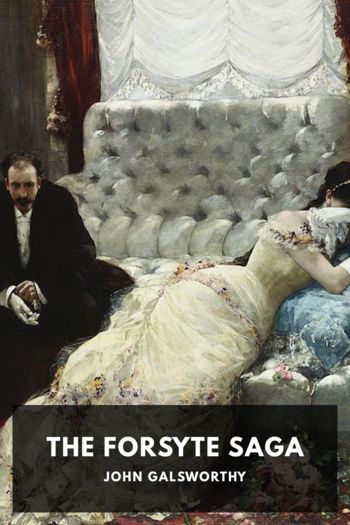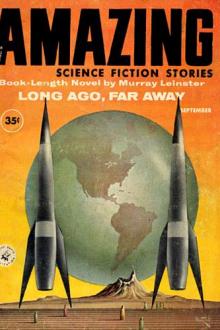The Forsyte Saga - John Galsworthy (best english novels for beginners .txt) 📗

- Author: John Galsworthy
Book online «The Forsyte Saga - John Galsworthy (best english novels for beginners .txt) 📗». Author John Galsworthy
“Looks as if he might make a bolt of it—the dashing Buccaneer!”
This “very singular-looking man,” as Mrs. Small afterwards called him, was of medium height and strong build, with a pale, brown face, a dust-coloured moustache, very prominent cheekbones, and hollow checks. His forehead sloped back towards the crown of his head, and bulged out in bumps over the eyes, like foreheads seen in the lion-house at the Zoo. He had sherry-coloured eyes, disconcertingly inattentive at times. Old Jolyon’s coachman, after driving June and Bosinney to the theatre, had remarked to the butler:
“I dunno what to make of ’im. Looks to me for all the world like an ’alf-tame leopard.” And every now and then a Forsyte would come up, sidle round, and take a look at him.
June stood in front, fending off this idle curiosity—a little bit of a thing, as somebody once said, “all hair and spirit,” with fearless blue eyes, a firm jaw, and a bright colour, whose face and body seemed too slender for her crown of red-gold hair.
A tall woman, with a beautiful figure, which some member of the family had once compared to a heathen goddess, stood looking at these two with a shadowy smile.
Her hands, gloved in French grey, were crossed one over the other, her grave, charming face held to one side, and the eyes of all men near were fastened on it. Her figure swayed, so balanced that the very air seemed to set it moving. There was warmth, but little colour, in her cheeks; her large, dark eyes were soft.
But it was at her lips—asking a question, giving an answer, with that shadowy smile—that men looked; they were sensitive lips, sensuous and sweet, and through them seemed to come warmth and perfume like the warmth and perfume of a flower.
The engaged couple thus scrutinized were unconscious of this passive goddess. It was Bosinney who first noticed her, and asked her name.
June took her lover up to the woman with the beautiful figure.
“Irene is my greatest chum,” she said: “Please be good friends, you two!”
At the little lady’s command they all three smiled; and while they were smiling, Soames Forsyte, silently appearing from behind the woman with the beautiful figure, who was his wife, said:
“Ah! introduce me too!”
He was seldom, indeed, far from Irene’s side at public functions, and even when separated by the exigencies of social intercourse, could be seen following her about with his eyes, in which were strange expressions of watchfulness and longing.
At the window his father, James, was still scrutinizing the marks on the piece of china.
“I wonder at Jolyon’s allowing this engagement,” he said to Aunt Ann. “They tell me there’s no chance of their getting married for years. This young Bosinney” (he made the word a dactyl in opposition to general usage of a short o) “has got nothing. When Winifred married Dartie, I made him bring every penny into settlement—lucky thing, too—they’d ha’ had nothing by this time!”
Aunt Ann looked up from her velvet chair. Grey curls banded her forehead, curls that, unchanged for decades, had extinguished in the family all sense of time. She made no reply, for she rarely spoke, husbanding her aged voice; but to James, uneasy of conscience, her look was as good as an answer.
“Well,” he said, “I couldn’t help Irene’s having no money. Soames was in such a hurry; he got quite thin dancing attendance on her.”
Putting the bowl pettishly down on the piano, he let his eyes wander to the group by the door.
“It’s my opinion,” he said unexpectedly, “that it’s just as well as it is.”
Aunt Ann did not ask him to explain this strange utterance. She knew what he was thinking. If Irene had no money she would not be so foolish as to do anything wrong; for they said—they said—she had been asking for a separate room; but, of course, Soames had not. …
James interrupted her reverie:
“But where,” he asked, “was Timothy? Hadn’t he come with them?”
Through Aunt Ann’s compressed lips a tender smile forced its way:
“No, he didn’t think it wise, with so much of this diphtheria about; and he so liable to take things.”
James answered:
“Well, he takes good care of himself. I can’t afford to take the care of myself that he does.”
Nor was it easy to say which, of admiration, envy, or contempt, was dominant in that remark.
Timothy, indeed, was seldom seen. The baby of the family, a publisher by profession, he had some years before, when business was at full tide, scented out the stagnation which, indeed, had not yet come, but which ultimately, as all agreed, was bound to set in, and, selling his share in a firm engaged mainly in the production of religious books, had invested the quite conspicuous proceeds in three percent consols. By this act he had at once assumed an isolated position, no other Forsyte being content with less than four percent for his money; and this isolation had slowly and surely undermined a spirit perhaps better than commonly endowed with caution. He had become almost a myth—a kind of incarnation of security haunting the background of the Forsyte universe. He had never committed the imprudence of marrying, or encumbering himself in any way with children.
James resumed, tapping the piece of china:
“This isn’t real old Worcester. I s’pose Jolyon’s told you something about the young man. From all I can learn, he’s got no business, no income, and no connection worth speaking of; but then, I know nothing—nobody tells me anything.”
Aunt Ann shook her head. Over her square-chinned, aquiline old face a trembling passed; the spidery fingers of her hands pressed against each other and interlaced, as though she were subtly recharging her will.
The eldest by some years of all the Forsytes, she





Comments (0)